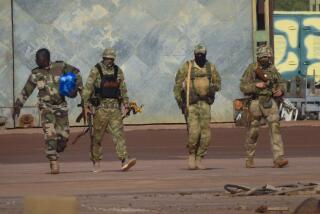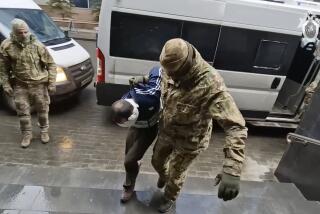Now Bin Laden Is Face of Evil for Russia Too
- Share via
MOSCOW — With the spate of recent terrorist bombings in Moscow and southern Russia, the nation learned a name already familiar, and frightening, to Americans: Osama bin Laden.
After the apartment bombings that killed more than 300 Russians and terrified the nation this month, the Saudi millionaire’s name was suddenly all over the Russian media, and the threat of international terrorism was on every politician’s lips.
Russians digested the news that their newfound enemy may be the same as America’s--the man said to be behind the bombings of U.S. embassies in Africa a year ago.
Russia’s old foes have suddenly become more sinister, amid speculation that Bin Laden is supporting them. The No. 1 threat to the country is no longer just separatist bandits such as Shamil Basayev and Khattab but is also now international terrorists such as Shamil Basayev and Khattab.
With Russian intelligence blaming the two guerrilla leaders for the bombings--and linking Bin Laden to the pair--the attacks raised the specter that Russia now faces a strong, highly organized and fanatical enemy capable of taking the Islamic fundamentalist fight for control of the Caucasus right to the heart of Russia.
Since last month, Basayev and Khattab--who goes by only one name--have been leading a guerrilla campaign to split Dagestan, which neighbors separatist Chechnya, from Russia. But is Bin Laden a hidden enemy funneling vast amounts of money and fighters into Chechnya, as the Russians claim? Or are the enemies just some of the same rebels Russia fought--and lost to--earlier this decade, but with higher ambitions?
Building Support for Military Action
Russian officials are invoking the name of Bin Laden to sharpen the popular appetite for a new wave of punitive military action against Chechnya: intensive air attacks against its villages (or, as Russia tends to call them during military operations, rebel bases).
Basayev and Khattab are now a threat to be whipped up, not downplayed the way they were as key Chechen commanders who helped turn back Russian forces in the 1994-96 war over Chechnya’s bid for independence. In those days, Russian generals dismissed the enemy as “bandit formations” and the war as “mopping-up operations.”
According to an account by intelligence sources published in the Russian daily Sevodnya after the bomb attacks, Bin Laden is funding Chechen rebel forces, organizing terrorist training camps in Chechnya and even planning to set up key bases of his own there. The FSB, a KGB successor agency, claims he is investing 10% of his funds in the Chechen-Dagestani effort. The Interior Ministry claims that Bin Laden has ordered the collection of $30 million for the cause.
“If we had as much money as is being claimed, if we had such possibilities, we would hardly be in such a difficult situation,” Basayev said, denying the link to Bin Laden in an interview before the big Moscow bombings, published Sept. 9, by the Czech newspaper Lidove Noviny. “What we have is gathered penny by penny, and today there is nobody who would provide any significant help to us. Had there been someone who would cooperate with us on specific terms, Russia would have ceased to exist long ago.”
Yossef Bodansky, author of “Bin Laden: The Man Who Declared War on America” and director of the U.S. Congress task force on terrorism, believes that Bin Laden has a long relationship with Basayev, going back to early 1994, several months before the war over Chechen independence began. Bodansky is also a consultant to the Freeman Center for Strategic Studies, an Israeli think tank.
He asserts that Bin Laden’s control of the Afghan drug trade enables the Saudi exile to channel large amounts of funding and equipment to Chechnya. “So there’s no shortage of money for the Dagestan adventure.”
Analysts such as Bodansky credit Bin Laden’s network with transforming the Chechen conflict, which began as a separatist struggle, into a fundamentalist jihad aiming to establish Islamic rule throughout the Caucasus.
“They’re going to go after it, and they’re going to continue and take a lot of setbacks and lick their wounds and come back again and again,” Bodansky said. “It’s a perpetual jihad that cannot stop and will not stop. The Russians have a mess on their hands. It’s going to be a long, long war. It’s a historical tidal wave.”
Ben Venzke, senior consultant with Pinkerton Global Intelligence Services in Virginia, said it is widely accepted in U.S. intelligence circles that Bin Laden’s network is actively involved in raising funds for Muslim fighters in Chechnya and Dagestan, although questions about the level of support remain.
“I would not doubt there was some kind of involvement by Bin Laden in the bombings,” he said, referring to the attacks in Moscow and southern Russia. “It does not mean he issued the orders. It means he’s supporting those who are carrying out the orders.”
But the evidence is circumstantial, based on the view that Bin Laden would support the idea of a fundamentalist Islamic Caucasus and would therefore give money to the cause if asked.
British military analysts aren’t convinced of his involvement. “The problem is that Osama bin Laden is everybody’s boogeyman. We have absolutely no credible evidence whatsoever to link [him] to the Caucasus,” said Maj. Charles Heyman, editor of Jane’s World Armies, who has been investigating the issue.
He argues that a small amount of money is flowing to Chechnya from foreign Muslim supporters and that the war is mostly financed by the proceedings of crime.
Heyman said there are 200 to 300 highly skilled foreign Muslim fighters among the guerrilla forces in Chechnya. Rebel leader Basayev is open about the foreign involvement. Among the 34 rebel casualties he conceded early this month, there were five Arabs and three Turks.
Anatol Lieven, who is an expert on the former Soviet Union at the London-based Independent Institute for Strategic Studies and covered the Chechen war extensively for the Times of London, says he met few foreign Muslim fighters then--just four Arabs.
The big increase suggests that Basayev and Khattab’s forces have gained significantly in strength and expertise since the war ended in 1996, making them one of the toughest, best-trained guerrilla armies in the world.
But to hear Russian politicians, Moscow is ready to annihilate them. Russia’s ignominious defeat is all but forgotten. Russia never should have made a peace deal with the Chechens in 1996, Prime Minister Vladimir V. Putin argued recently, suggesting that it’s time to give the enemy a proper whipping while promising more punitive air attacks.
There are now roughly 30,000 Russian troops arrayed along the Chechen border, facing down 2,000 opposing Chechen fighters, provoking speculation in Russia’s media of a new invasion of Chechnya.
In Russia, the thirst for revenge against Chechnya over the terrorist bombings is not only based on fears that Bin Laden is behind Basayev and Khattab, it is also fueled by a widespread view that Russian forces are poised to deliver a punishing blow to the rebels. The skepticism about military propaganda that was present during the Chechen war no longer exists.
The claims by Russian military officials that they have learned the lessons of the Chechen war--in which thousands of raw young troops were sacrificed in hopelessly botched operations--have gone largely unchallenged. In the recent Dagestani fighting, Russia won the propaganda war at least.
Seems Like Old Times for Russian Forces
Little by little, however, the truth is dripping out. There is evidence that the Russian military is behaving exactly as it did in Chechnya. In Dagestan, Russian tank forces are demoralized and scared and haven’t been paid for a long time. They’re selling their weapons to whoever will buy them, according to an eyewitness account gleaned by Heyman of Jane’s World Armies.
Several parliamentary deputies who have traveled from Moscow to Dagestan have accused the military of hiding the high Russian death toll, as it did in the Chechen war. Russian bombs killed many Russian soldiers, they charged.
And there is no reason to doubt claims by Chechen leaders, who are not associated with Basayev and Khattab’s guerrilla campaign, that the present bombing of villages in Chechnya is killing many civilians too.
Heyman says Russia’s air raids won’t destroy the guerrillas, just wreck villages, kill civilians and harden resolve on the other side. It’s the same army, fighting the same people, using largely the same methods.
But for Russia, it’s a different enemy, even more fiendish than last time.
More to Read
Sign up for Essential California
The most important California stories and recommendations in your inbox every morning.
You may occasionally receive promotional content from the Los Angeles Times.










